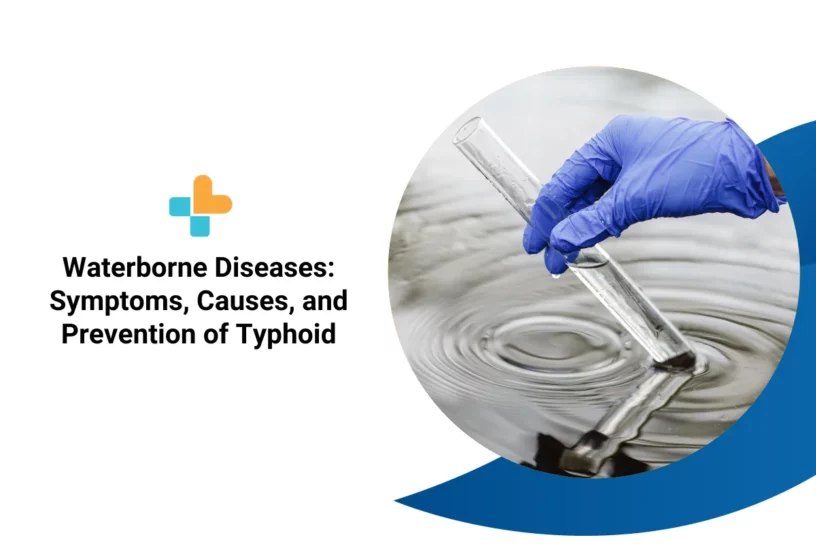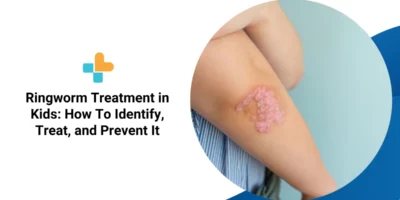Did you know that water can be a source of diseases that can severely affect your health? Waterborne diseases are a real threat, and one such disease is typhoid.
Typhoid is a bacterial infection caused by contaminated water and food and is common in many parts of the world. The symptoms of typhoid can range from mild to severe, and if left untreated, it can even be life-threatening.
In this blog, we will explore the symptoms, causes, and prevention of typhoid to help you understand the importance of clean water and sanitation and keep yourself and your loved ones safe from this waterborne disease.
Symptoms of Typhoid
Typhoid is a bacterial infection that can cause a variety of symptoms ranging from mild to severe. Typhoid symptoms typically appear gradually, and they can take one to three weeks to manifest after exposure to the bacteria. The following are some typical typhoid symptoms:
- High fever, which can reach up to 104 degrees Fahrenheit
- Weakness and fatigue
- Headache
- Abdominal pain and discomfort
- Loss of appetite
- Constipation or diarrhoea
- Rash of flat, rose-coloured spots
- Dry cough
If you have any of these symptoms, seek medical attention right away, especially if you have recently travelled to a high-risk area or have come into contact with someone who has typhoid. Early detection and treatment are critical for avoiding complications and ensuring a full recovery.
Causes of Typhoid
Salmonella typhi, which is typically found in tainted food and water, is the bacterium that causes typhoid. The following are the most typical typhoid causes.
1. Contaminated Water

Consuming water that has been contaminated with the Salmonella typhi bacteria is a common cause of typhoid. This can occur if the water supply is infected with germs from sewage or if water sources, such as wells or reservoirs, are contaminated.
2. Contaminated Food
Eating food that has been prepared or handled by someone infected with the Salmonella typhi bacteria can lead to typhoid. Contamination can occur if the food is washed or prepared with contaminated water or if the person preparing the food does not follow proper hygiene practices
3. Poor Sanitation

Inadequate sanitation facilities, such as inadequate sewage systems or improper human waste disposal, can contribute to the spread of typhoid. This makes it easier for the infection to spread by allowing the bacteria to contaminate water and food sources.
4. Close Contact

Typhoid can also be spread through close contact with an infected individual. Direct contact with their faeces can cause this, as can ingesting food or water that has been tainted by the infected person.
Prevention of Typhoid
Preventing typhoid involves taking steps to ensure that you do not come into contact with the bacteria Salmonella typhi. Here are a few ways to avoid typhoid:
- Practise good hygiene, including frequent hand washing with soap and water.
- Be sure to only drink boiled, pure water. Use water that has been treated or disinfected in some other way.
- Use safe food handling techniques, such as cooking food correctly, washing produce, and avoiding street food and eateries with poor hygiene standards.
- Consider getting a typhoid vaccine, especially if you plan to travel to high-risk areas or have close contact with infected people.
- Ensure that there is access to facilities for good sanitation, including working sewage systems and effective waste disposal.
- If you have had close contact with an infected person or are experiencing typhoid symptoms, seek medical attention right away for proper diagnosis and treatment.
Preventing Typhoid: Stay Healthy With Ayu Health Hospitals
Typhoid is a serious waterborne disease that requires proper diagnosis and treatment to ensure a full recovery. At Ayu Health Network of Hospitals, we understand the importance of early detection and personalized care for typhoid patients.
Our team of experienced healthcare professionals is dedicated to providing high-quality treatment and support to help patients recover quickly and effectively.
If you or someone you know is experiencing symptoms of typhoid or has been in contact with an infected person, contact us today for an appointment.
Also Read : The Deadly Mosquito-Borne Diseases in India
Our Hospital Locations
General Surgery Hospitals in Chandigarh | General Surgery Hospitals in Bangalore | General Surgery Hospitals in Jaipur | General Surgery Hospitals in NCR | General Surgery Hospitals in Hyderabad
Our Doctors
General Surgery Doctors in Chandigarh | General Surgery Doctors in Bangalore | General Surgery Doctors in Jaipur | General Surgery Doctors in NCR | General Surgery Doctors in Hyderabad
About the Author

Dr. S. Goel
Dr. S. Goel is a renowned Internal Medicine Specialist currently practicing at Ayu Health, Bangalore. He is a Specialist in Internal Medicine, Diabetes HTN, Paediatric Care, and Family Medicine.




